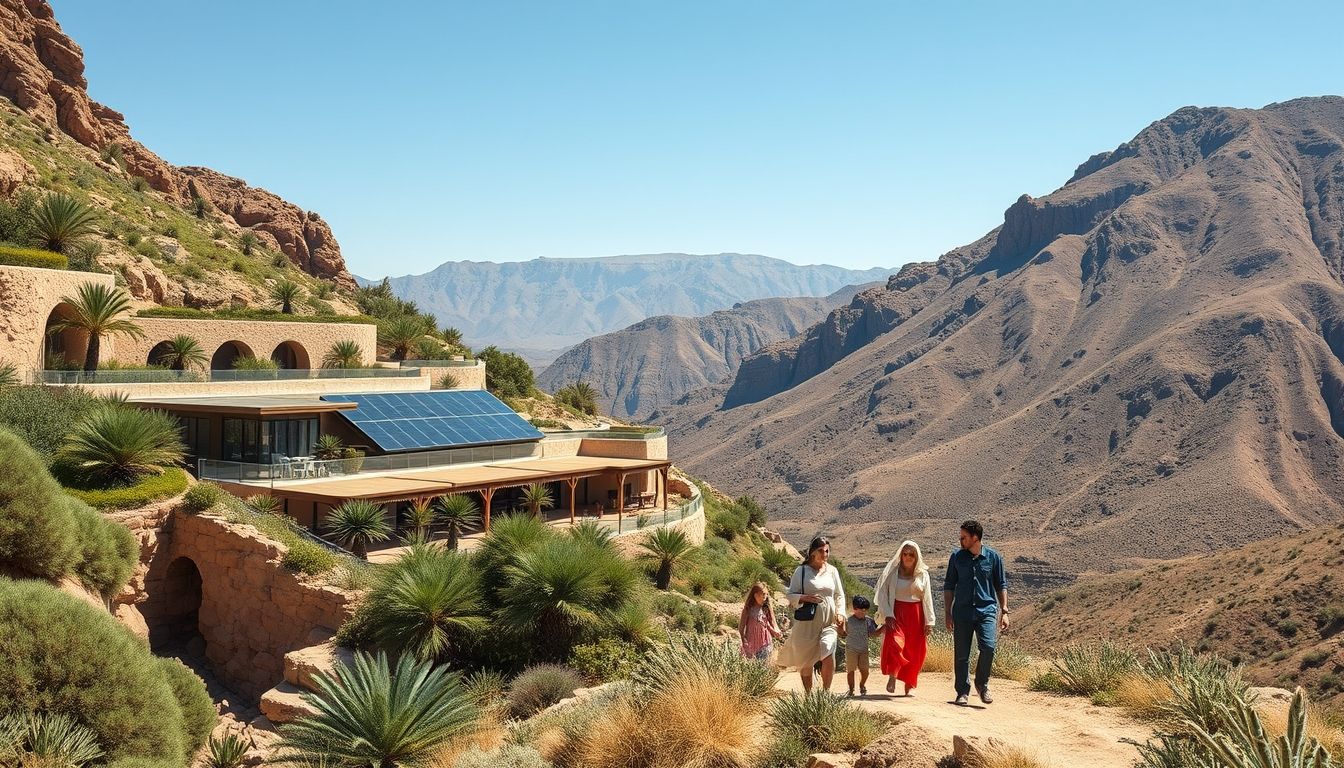Sustainable Tourism and Green Hospitality: Promising Investment Opportunities in the MENA Region
The tourism and hospitality sector is undergoing a radical transformation towards sustainability, driven by increasing consumer awareness and global market trends towards environmentally friendly practices. In the Middle East and North Africa (MENA) region, promising investment opportunities are emerging in this field, where the need to diversify income sources meets the desire to preserve the region's cultural and natural heritage.
Chapter 1: The Global Shift Towards Sustainable Tourism
Sustainable tourism is a comprehensive concept that aims to minimize the negative impacts of tourism on the environment and local communities, while maximizing economic and social benefits. This includes:
- Conserving natural resources: Reducing water and energy consumption, and protecting biodiversity.
- Supporting local communities: Providing employment opportunities, promoting local products, and respecting local culture.
- Reducing the carbon footprint: Using renewable energy sources, and promoting sustainable transportation.
Example: The "Six Senses Zighy Bay" resort in Oman implements sustainable practices such as using solar energy, recycling water, and supporting local farms to provide organic food.
Chapter 2: The Importance of Investing in Sustainable Tourism in the MENA Region
The MENA region has unique tourism assets, including historical sites, stunning beaches, and vast deserts. However, the region faces environmental and social challenges, such as water scarcity, desertification, and climate change. Investing in sustainable tourism can contribute to:
- Diversifying income sources: Reducing dependence on oil and gas, and creating new job opportunities.
- Preserving cultural and natural heritage: Protecting archaeological sites and nature reserves for future generations.
- Improving the region's image: Attracting environmentally and socially conscious tourists, and promoting the region as a responsible tourist destination.
Statistic: Estimates indicate that sustainable tourism could contribute up to 10% of the GDP in some countries in the region by 2030.
Chapter 3: Investment Opportunities in Green Hotels
Green hotels are among the most prominent areas of investment in sustainable tourism. These hotels include:
- Eco-friendly hotels: That use sustainable building materials, rely on renewable energy sources, and implement waste management programs.
- Wellness hotels: That provide a healthy environment for guests, using natural materials, providing healthy food options, and offering fitness and relaxation programs.
- Community-based hotels: That support local communities, by employing local residents, purchasing local products, and contributing to social projects.
Example: The "Al Maha, A Luxury Collection Desert Resort & Spa" in Dubai focuses on preserving the local desert environment and provides unique tourism experiences for guests.
Chapter 4: Investing in Eco-Resorts
Eco-resorts offer unique tourism experiences in nature, focusing on preserving the environment and local communities. These resorts include:
- Mountain resorts: That offer activities such as hiking, climbing, and skiing, with a focus on preserving forests and mountains.
- Beach resorts: That offer activities such as diving, snorkeling, and sailing, with a focus on protecting coral reefs and beaches.
- Desert resorts: That offer activities such as camel riding, camping, and stargazing, with a focus on preserving the desert environment.
Example: The "Kasbah du Toubkal" resort in Morocco is located in the Atlas Mountains and offers unique cultural and environmental tourism experiences, while supporting local communities.
Chapter 5: Investing in Agritourism
Agritourism combines tourism and agriculture, providing unique tourism experiences on farms and in fields. These experiences include:
- Visiting farms: Learning about traditional and modern farming methods, and participating in agricultural activities.
- Staying on farms: Staying in guesthouses on farms and enjoying fresh local products.
- Participating in agricultural festivals: Attending festivals that celebrate local agricultural products.
Example: Many farms in Lebanon offer unique agritourism experiences, where visitors can learn about olive and grape cultivation methods and participate in harvesting crops.
Chapter 6: Investing in Sustainable Cultural Tourism
Sustainable cultural tourism focuses on preserving the region's cultural heritage and supporting local communities. This tourism includes:
- Visiting historical sites: Learning about the region's history and culture, with a focus on preserving archaeological sites.
- Participating in cultural events: Attending festivals and celebrations that celebrate local culture.
- Purchasing local handicrafts: Supporting local artisans and purchasing handmade products.
Example: The city of AlUla in Saudi Arabia offers unique cultural tourism experiences, where visitors can explore ancient archaeological sites and learn about the region's history.
Chapter 7: Challenges Facing Investment in Sustainable Tourism
Despite the promising opportunities, investing in sustainable tourism in the MENA region faces some challenges, including:
- Lack of funding: Difficulty obtaining the necessary funding for sustainable projects.
- Lack of awareness: Lack of awareness of the importance of sustainable tourism among investors and officials.
- Regulatory challenges: Lack of clear laws and regulations to regulate sustainable tourism.
Chapter 8: The Role of Technology in Promoting Sustainable Tourism
Technology plays an important role in promoting sustainable tourism, through:
- Mobile applications: Providing information about sustainable hotels, restaurants, and tourist sites.
- Artificial intelligence: Improving resource management and reducing energy and water consumption.
- Virtual reality: Providing virtual tourism experiences, to reduce the need for travel.
Chapter 9: The Role of Governments and International Organizations
Governments and international organizations play a crucial role in promoting sustainable tourism, through:
- Developing policies and regulations: To regulate sustainable tourism and encourage investment in green projects.
- Providing funding and support: For sustainable projects, through grants and soft loans.
- Raising awareness and educating: About the importance of sustainable tourism, and encouraging tourists to adopt responsible practices.
Chapter 10: Tips for Investors in the Sustainable Tourism Sector
Here are some tips for investors wishing to invest in the sustainable tourism sector in the MENA region:
- Conduct research and studies: To understand the market and available opportunities.
- Partner with experts: To benefit from their expertise in the field of sustainable tourism.
- Focus on quality and innovation: To provide unique tourism experiences.
- Commit to environmental and social standards: To ensure long-term sustainability.
- Build strong relationships with local communities: To gain their support and trust.
In conclusion, investing in sustainable tourism and green hospitality represents a promising opportunity to achieve financial, social, and environmental returns in the MENA region. By adopting sustainable practices, investors can contribute to preserving the region's cultural and natural heritage, creating new job opportunities, and improving the region's image as a responsible tourist destination.




